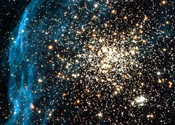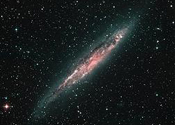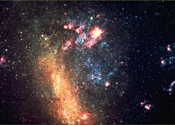Courses Overview
 |  |  |
Astrophysics deals with some of the most majestic themes known to science. Among these are the evolution of the universe from the Big Bang to the present day; the origin and evolution of planets, stars, galaxies, and the elements themselves; the unity of basic physical law; and the connection between the subatomic properties of nature and the observed macroscopic universe.
Graduate Student Adviser: Kyle M. Cudworth, Yerkes Observatory
Student Affairs Assistant: Laticia Rebeles, AAC 120, 702-9808
Departmental Secretary: Stacy Cummings, AAC 118, 702-8203
Three sequences of courses present the study of Astronomy and Astrophysics topics in different scope and depth:
(1) PHSC 11900-12000-12700 is a two- or three-quarter sequence that satisfies the general education requirements in the physical sciences. The first two quarters cover the formation and evolution of stars, the galaxy, and the extragalactic universe; and the third quarter deals with the solar system. NTSC 10100-10200-10300-10400 is a four-quarter sequence that satisfies the general education requirements in physical sciences and biological sciences. NTSC 10200 deals with the evolution of the universe.
(2) For students seeking a more in-depth examination of selected astrophysical topics, astronomy courses numbered in the 18000s are offered, usually to be taken in their second year or later. These courses are intended for students from throughout the College.
(3) For students considering graduate work in astrophysics, the Department of Astronomy and Astrophysics recommends the program leading to a degree of B.A. in Physics with Specialization in Astrophysics. For details, see the Physics section of this catalog. Tutorial and research courses are available in addition to more informal opportunities for work and study in the Department of Astronomy and Astrophysics. Participation in a weekly seminar on current topics in astrophysical research is also recommended.
Undergraduate Courses
ASTR 18100. The Milky Way
ASTR 18200. The Origin and Evolution of the Universe
This course discusses how the laws of nature allow us to understand the origin, evolution, and large-scale structure of the universe. After a review of the history of cosmology, we see how discoveries in the twentieth century (i.e., the expansion of the universe and the cosmic background radiation) form the basis of the hot Big Bang model. Within the context of the Big Bang, we learn how our universe evolved from the primeval fireball.
ASTR 18300. Searching Between the Stars
With the advent of modern observational techniques such as radio and satellite astronomy, it has become possible to study free atoms, molecules, and dust in the vast space between the stars. The observation of interstellar matter provides information on the physical and chemical conditions of space and on the formation and evolution of stars.
ASTR 18500. The Lives and Deaths of Stars
In this course we study the observed properties of stars and the physics that enables us to understand them. Star formation, stellar evolution, and the deaths of stars are discussed. (Offered in alternate years.)
ASTR 20000. Tutorial in Astronomy and Astrophysics
Students in this tutorial read topics in astronomy and astrophysics under the supervision of a faculty member. Students meet with the instructor in groups of one to three for approximately two hours per week to discuss readings on mutually agreed-upon topics.
ASTR 21300. Origin and Evolution of the Solar System
Representative topics include abundance and origin of the elements; formation, condensation, and age of the solar system; meteorites and the historical record of the solar system they preserve; comets and asteroids; the planets and their satellites; temperatures and atmospheres of the planets; and the origin of the Earth's lithosphere, hydrosphere, atmosphere, and biosphere.
ASTR 24100. The Physics of Stars and Stellar Systems
Building upon a student's previous knowledge of physics, this course introduces the astrophysics of stars and stellar systems with an emphasis on the physical nature of stars. Topics include the tools of astronomy, both observational and theoretical Hertzsprung-Russell diagrams, structure and evolution of stars, binary stars, star clusters, and end states of stars such as white dwarfs, neutron stars, and black holes.
ASTR 24200. The Physics of Galaxies and the Universe
Physical laws are applied in the study of the structures and evolution of galaxies, quasars, clusters of galaxies, and the universe at large.
ASTR 28200. Current Topics in Astrophysics
An area of current research interest in astrophysics is explored in considerable detail. The topic varies, but some examples include the early universe, high energy astrophysics, magneto-hydrodynamics in astrophysics, and observational cosmology.
ASTR 29700. Participation In Research: Astronomy and Astrophysics
Students are assigned to work in the research group of a member of the faculty. Participation in research may take the form of independent work on a small project or assistance to an advanced graduate student or faculty member in his or her research.
NTSC 10200. Evolution of the Universe
PHSC 11900. Stellar Astronomy and Astrophysics
PHSC 12000. Origin of the Universe and How We Know
PHSC 12700. Planets, Comets and Asteroids
Graduate Courses
ASTR 30100. Astrophysics I (Detailed Outline)
Introduction to stars (physical and observational), hydrodynamics of self-gravitating fluids, statistical mechanics and equations of state, energy transport, astrophysical nuclear reactions, stellar models, advanced topics.
ASTR 30200. Astrophysics II (Detailed Outline)
Star formation, main sequence evolution, post-main sequence evolution, degenerate stars, and supernovae.
ASTR 30300. Astrophysics III (Detailed Outline)
Interstellar medium, collisionless systems, distribution of stars in the solar neighborhood, stellar kinematics/dynamics, observations of galactic large-scale structure, theory of galactic structure and evolution.
ASTR 30400. Astrophysics IV (Detailed Outline)
The observed universe, the universe at high redshift, early universe microwave background radiation, relativistic homogeneous isotropic cosmologies, evolution of structure in the universe, primordial nucleosynthesis.
ASTR 30500. Radiative Processes in Astrophysics (Detailed Outline)
Fundamentals of radiative transfer, theory of stellar atmospheres, basic theory of radiation fields, continuum emission processes, atomic and molecular emission, plasma effects.
ASTR 30600. Radiation Measurements in Astrophysics (Detailed Outline)
Radiation as a random process, optical coherence, and signal analysis in spatial and temporal domains, along with the detection and measurement of radiation with astronomical instruments.
ASTR 30700. Preparation for Summer Research Project
Students work with faculty members to select their research project topic and study the published literature related to it.
ASTR 30800. Summer Research Project
Research project pursued during the summer between a student’s first and second years of graduate school.
ASTR 30900. Research Project Seminar
Students present a seminar series based on their summer research projects.
ASTR 31300. Extragalactic (Astrophysics) Studies
Interpretation of observations of galaxies, quasars, and intergalactic material. The structure of selected individual objects is discussed as well as the contents of the universe as a whole. (Offered biannually.)
ASTR 31500. Dynamics I (Fluids)
Principles of hydrodynamics and hydromagnetics. Equilibrium and stability of fluid systems in astrophysics. Waves. Shocks. Turbulence. (Offered biannually.)
ASTR 31600. Dynamics II (Particle Systems)
Dynamics of collisionless plasmas and stellar systems. Stochastic processes and kinetic equations. Dynamics of galaxies and star clusters. Astrophysical plasmas. (Offered biannually.)
ASTR 32000. Relativistic Astrophysics
Special and General relativity and the experimental tests, with applications to astrophysical problems such as super-massive stars, black holes, relativistic star clusters, and gravitational radiation. (Offered biannually.)
ASTR 32100. Cosmology
Study of physical cosmology with emphasis on the standard big-bang model and its observational and experimental tests. (Offered biannually.)
ASTR 33000. Computational Astrophysics
Basic computational methods useful for astrophysics, supplemented by specific examples drawn primarily from astrophysics. Starting with basics (e.g., precision, errors and error analysis) and basic computational methods (differentiation, integration/quadrature, Monte Carlo, numerical linear algebra), and then discussing solution of problems posed in terms of ordinary and partial differential equations.
ASTR 34000. Statistical Methods in Astrophysics
An exploration of the variety of statistical methods used in modern astrophysics. (Offered biannually.)
ASTR 36100. Interstellar Matter
Physics of the Interstellar Gas. Emission nebulae. H I regions. Interstellar grains and molecules. Cosmic rays and the inter-stellar magnetic field. (Offered biannually.)
ASTR 37100. Pre-Candidacy Research
ASTR 37200. Readings in Astronomy and Astrophysics
ASTR 38100. General History of Astrophysics
ASTR 38800. Galileo's Astronomy and Conflicts with the Church
This course is devoted to Galileo's work in astronomy, above all the Dialogue on the Two Great Systems of the World, and his conflicts with the Church concerning the interpretation of Scripture and the attempt to prove the Copernican theory.
ASTR 38x00. Topics in History of Astronomy
(numbers vary within the 38000-series)
ASTR 39900. Reading/Research in Astrophysics
Specialized and Advanced Graduate Courses
Courses numbered 40000 - 48000 are lecture or seminar courses taught from time to time in specialized or advanced topics in fields in which members of the department are working. Admission to any of these is by permission of the instructor. Typical courses include:
ASTR 40100. Practicle Data Analysis
ASTR 40200. Particle Astrophysics
ASTR 40300. Structure Formation in the Universe
ASTR 40400. QSOs in the SDSS
ASTR 40600. Gravitational Lensing
Theory of bending of light by gravitational potentials followed by astrophysical and cosmological applications including: microlensing, planetary searches, strong lensing, and weak lensing.
ASTR 41300. Topics in Stellar Astronomy
ASTR 41400. Advanced Stellar Dynamics
ASTR 41500. Astrophysical Jets
ASTR 41600. Intergalactic Medium
ASTR 42200. Early Universe Cosmology
ASTR 42700. Atomic Structure and Spectra
ASTR 43000. Plasma Astrophysics
ASTR 43100. Ultra-High Energy Cosmic Rays
ASTR 43300. Accretion Disks
ASTR 43600. Theory of Supernovae
ASTR 44200. Topics in Astrophysical Fluid Dynamics
ASTR 45100. High Resolution Imaging
ASTR 45200. Primer on the SDSS
ASTR 45300. Computational Cosmology
ASTR 46400. Nuclear Astrophysics
ASTR 46500. Atomic Spectra
ASTR 47100. Evolution of Galaxies
ASTR 47200. Star Clusters
ASTR 47300. Distant Galaxies
ASTR 48000. Current Topics in Astrophysics (Graduate)
ASTR 48100. Advanced Computational Techniques
ASTR 48200. Dark Energy and Cosmic Acceleration
ASTR 49400. Postcandidacy Research in Astrophysics